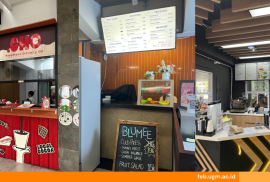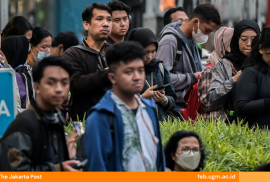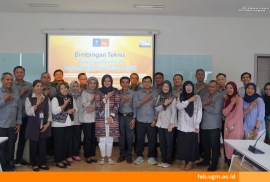The basic function of accounting is to provide financial information and as an instrument of accountability for financial managers in both business and the public sector. In general, the public recognizes the role of accounting in the banking sector, public accountants, BUMN, et cetera as accountants or auditors. However, in fact, the role of graduates majoring in accounting today is not limited to that role. Now, accounting scholars can, and are even required to, take part in efforts to eradicate and prevent corruption. In connection with this topic, on Saturday (29/10) the Center for the Study of Accounting Education (PKAP) Accounting Laboratory, Department of Accounting, Faculty of Economics and Business UGM (FEB UGM) held a National Seminar with the theme “Bachelor of Accounting and Prevention of Corruption.”
The National Seminar aims to provide socialization of the role of accounting in life in the era of globalization, particularly related to the role of accounting in preventing corruption. The event was held both offline and online and was attended by participants from prospective high school graduates throughout Indonesia who had an interest in accounting. There were three speakers present, namely Arika Artiningsih, S.E., M.Acc., M.Com., M.Res., Ph.D., Rijadh Djatu Winardi, S.E., M.S.c., Ph.D., CFE., and Wuri Handayani, S.E., Ak., M.Sc., M.A., Ph.D.
According to the Big Indonesian Dictionary (KBBI), corruption is a form of misappropriation or misuse of state money (companies, organizations, foundations, and so on) for personal gain or others. As the first speaker at the seminar, Arika Artiningsih, S.E., M.Acc., M.Com., M.Res., Ph.D explained the topic material titled as “The Role of Accountants in Prevention and Detection of Corruption in the Business Sector.” Based on her explanation, accountants have several roles in eradicating corruption fraud, including as internal auditors and external auditors. Internal auditors help control the organization to minimize fraud. Meanwhile, the external auditor is responsible for the fairness of the organization’s financial statements independently. In addition, accountants can also play a role through strategic actions such as designing a code of ethics and designing anti-fraud policies.
Then, the event continued to the second speaker session, namely Rijadh Djatu Winardi, S.E., M.S.c., Ph.D., CFE. In the presentation of his material topic titled as “Corruption in the Government Sector,” Rijadh explained the types of fraud that can be categorized as acts of corruption such as bribery, embezzlement, abuse of authority, and money laundering. Rijadh stated that bribery is the most common type of corruption in Indonesia. Not only that, Rijadh also explained the impact of corruption which among others resulted in an increase in income inequality, a relatively small economic multiplier, and misallocation of resources.
The discussion on ethics and anti-corruption topics was also discussed in the national seminar delivered by the third speaker, Wuri Handayani, S.E., Ak., M.Si., M.A., Ph.D. Professions such as lecturers, public accountants, doctors, and others are bound by ethics. Graduates who are engaged in these fields need to take an oath to carry out their obligations in accordance with the code of ethics that regulates how the profession should be carried out. The public accounting profession itself has five codes of ethics, namely integrity, objective, competent, independent, and confidentiality. Integrity means consistency between words and actions, objective means revealing all mistakes objectively, competent means based on the expertise possessed, independent means accountants must be able to maintain their independence regarding their decisions, and confidentiality means protecting information of the company.
“Corruption is ingrained in Indonesia, we must immediately start efforts to eradicate it from ourselves and start now. Let’s fight corruption together and prevent corruption,” said Wuri as she ended the seminar.
Reportage: Kirana Lalita Pristy




